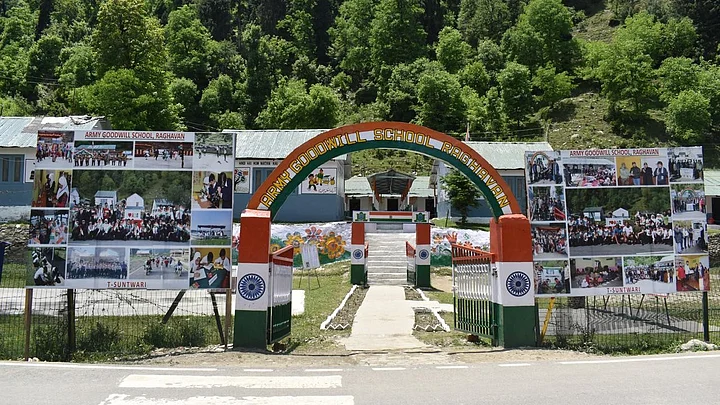(Click here to read Part I of this article.)
A recent visit to an Army Goodwill School and to a nearby government school in Machhal, a remote corner of Jammu and Kashmir, brought home to me how well the Army’s schools are functioning, and the extent to which they offer the children of nearby communities a better future.
This raises a fundamental conundrum. The army’s role is to fight to defend the country from external enemies, not to run schools or police civilian areas. On the other hand, the fact is that the army is doing a commendable job at those tasks, which civilian authorities just don’t seem willing to undertake earnestly—at least in this unfortunate union territory.
For the moment, then, continuing with the Army’s Schools seems necessary. Many of the Army’s other civic schemes, such as women’s sewing or embroidery centres, should be discontinued—and do seem to have been wound down in recent years. Encouraged by the civil administration, women’s Self-Help Groups are doing tremendous work for women’s employment and empowerment, as in so many other parts of the country.
Sadbhavana Purpose and Legacy
Army Goodwill Schools were set up under the Army’s Sadbhavana initiatives, which were designed to help the Army build good relations with the public at large at a time when Pakistani and Afghan militants were wreaking havoc in the Valley. The plan was approved in 1998 when the army needed the people to at least remain neutral with regard to the war-like situation.
The phase of suicide attacks at army camps began the next year, which further underlined the need for the forces to improve relations with people at large. Of course, that tense time, accompanied by the Kargil war, also delayed the implementation of Sadbhavana.
Ironically, most of the long-term Sadbhavana projects, such as schools, were started just when troops were massed on the border with Pakistan at the end of 2001. That forced President Musharraf to significantly bring down the scale and scope of militancy, particularly the relatively more lethal participation of Pakistanis and Afghans.
However, these projects kept growing while militancy saw several ebbs and spurts over the next couple of decades, and was replaced or accompanied by agitations in certain phases.
Now, a quarter-century after Sadbhavana was initiated, there is peace—however fragile—and the army generally has good relations with the public. In this light, the Goodwill Schools ought ideally to be handed over to the education department of the civil government.
But, my unannounced, unexpected visits showed me that that would almost certainly bring down the performance of Goodwill Schools, and hurt the interests of the children, their often relatively poor families, and the community at large.
This conundrum is also obvious in the maintenance of peace. Given the lack of unrest—or, until recently, violence— for several years some might argue that the army need not be deployed in civilian areas. However, people at large, particularly in relatively remote areas of Kupwara district, say that they prefer the army men (of Rashtriya Rifles) deployed around them to the Special Task Force of the police.
People at large say that the latter tend to be contemptuous, abusive, and arbitrary. Even the regular police is reputed to be corrupt, venal and unresponsive—although there are no doubt many honourable exceptions.
Given the spurt of terrorist attacks that began in the Jammu province just as the government was being sworn in afresh, it is difficult to say that violence and anti-state activities are a thing of the past. It tends to crop up in spurts, generally unexpectedly.
It has been 30 years since the Rashtriya Rifles force was deployed in Jammu and Kashmir in very large numbers in 1994. That exceptional Army chief, General BC Joshi, had planned for RR to be administered by the Home Ministry, only trained and equipped by the Army. But that got transformed to the extent that the Home Ministry only pays for RR; it functions entirely as a part of the Army.
Given the situation in that other border state, Manipur, one wonders if RR should continue to be deployed long-term in Jammu and Kashmir—as the Army certainly wants.
There has been a no-holds-barred civil war in Manipur for more than a year now, and the police and the state government have both been partisan. People on both sides of the divide there appear to still trust the Army and its wing in that part of the country, the Assam Rifles—not to speak of the Congress, which recently won both seats in the Lok Sabha. These forces seem to be the last hope for the protection of life, if not liberty, for many citizens in that terribly unfortunate state.
Jammu and Kashmir, too, has gone through periods of intense violence, which has included the ethnic cleansing of a religion-based community from the Valley in 1990. The sad fact is that many citizens of the Pandit community, and minorities in other pockets of this disturbed union territory, at times feel more comfortable with the Army than the police.
Of course, continued RR deployment would require the continuation of the Armed Forces Special Powers Act (AFSPA), which willy-nilly squeezes ordinary citizens’ right to life and liberty. Of course, one might argue that, the way the STF often functions in J&K, that happens in any case—and, in practice, with less discipline or adherence to rules.
Just as with the conundrum regarding Army-run schools, it is a tough conundrum, as difficult to sort out as a Rubik’s Cube—as long as violence is allowed to thrive.
(The writer is the author of ‘The Story of Kashmir’ and ‘The Generation of Rage in Kashmir’. He can be reached at @david_devadas. This is an opinion piece and the views expressed above are the author’s own. The Quint neither endorses nor is responsible for the same.)
(At The Quint, we question everything. Play an active role in shaping our journalism by becoming a member today.)
